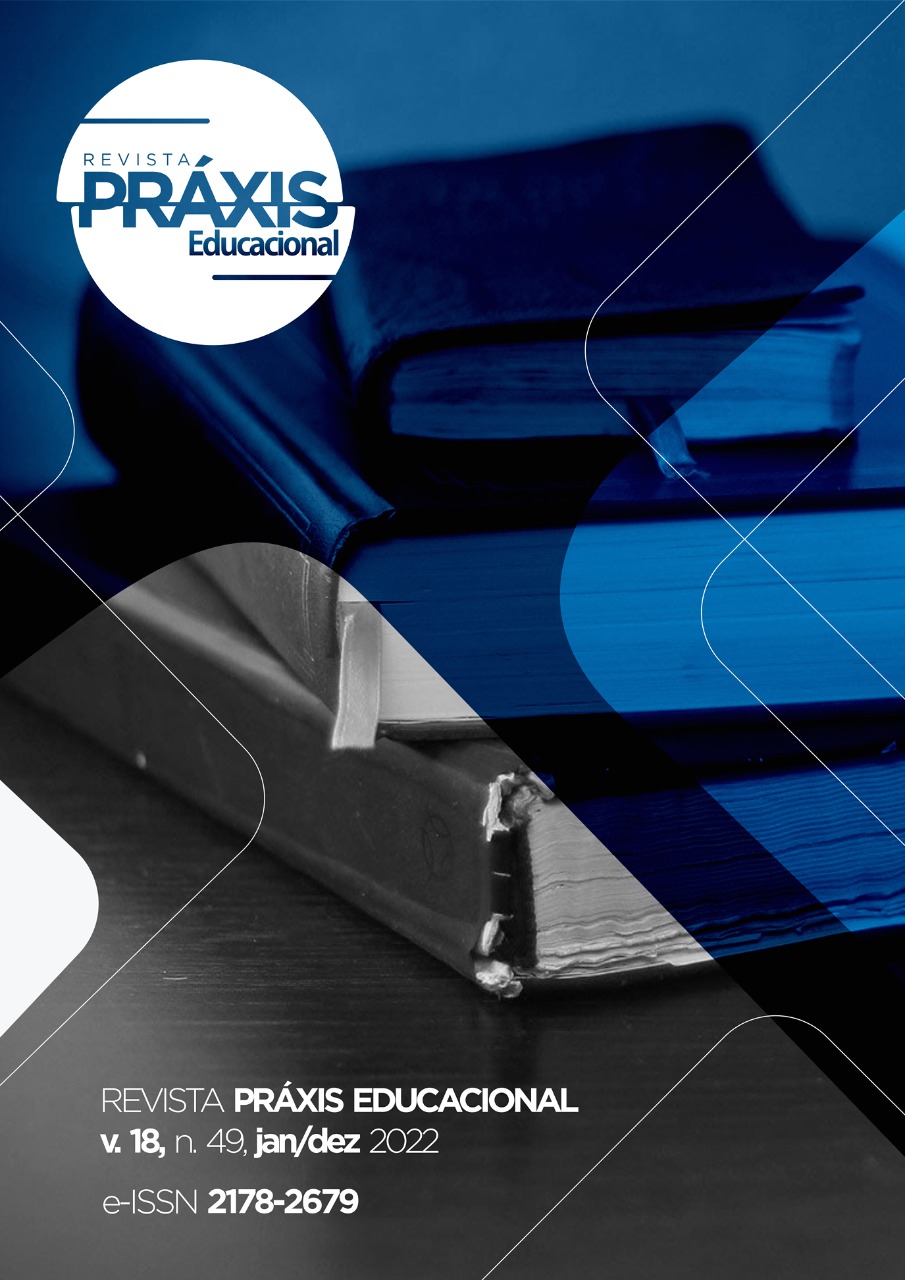The subject of art and the theater: regulation and autonomy of the formal curriculum (1996-2016)
DOI:
https://doi.org/10.22481/praxisedu.v18i49.11524Keywords:
school culture, formal curriculum, art teachingAbstract
The present article analyzes art as a school subject that occupies a place made up of prescriptions that regulate its practice. The choices that define curriculum content and procedures may vary. States and Municipalities, through their professional staff, produce local approaches, supported by guidelines. However, these definitions are supported by regulations that guide the professionals from one specific place, made by a State that, despite having decentralized curricular definitions, does not give up on keeping conducting its orchestra. Given this context, the question that articulated the writing of this article is: How are the different guidelines that regulate the subject of art combined: theater language in the formal curriculum of the municipality of Maringá? The research methodology was directed by the content analysis proposed by Bardin (2016). The curriculum prescriptions were understood from the concept of strategy suggested by Certeau (1998), since they intend to reasonably structuralize, standardize, command, and plan the groundwork of teaching and learning practices. In our final considerations, we explain the subject of art that belongs to the school culture and, therefore, is guided by structuring regulatory elements. In view of the regulatory elements, it is possible to notice discrepancies in the intentions to control the action of the individuals who receive the curriculum prescription, being greater within the municipality. This can cause the attribution of less autonomy to teachers and students, as well as a higher transfer of autonomy between federated entities, that is, between the powers of the bodies in the administrative structure of public education systems.
Downloads
References
BARDIN, Laurence. Análise de conteúdo. Tradução: Luís Augusto Pinheiro. São Paulo: Edições 70, 2016.
BERTICELLI, Ireno Antonio. Currículo: tendências e filosofia. In: COSTA, Marisa Vorraber. (org.). O currículo nos limiares do contemporâneo. 4. ed. Rio de Janeiro: DP&A, 2005.
BRASIL. Lei nº 13.278, de 2 de maio de 2016. Altera o § 6o do artigo 26 da Lei no 9.394/96, referente ao ensino da arte. Brasília: Presidência da República, 2016. Disponível em: http://www.planalto.gov.br/ccivil_03/_Ato2015-2018/2016/Lei/L13278.htm. Acesso em: 02 fev. 2019.
BRASIL. Lei nº 9.394, de 20 de dezembro de 1996. Estabelece as diretrizes e bases da educação nacional. Diário Oficial da União, Brasília, 1996. Disponível em: http://www2.senado.leg.br/bdsf/bitstream/handle/id/529732/lei_de_diretrizes_e_bases_1ed.pdf. Acesso em: 10 nov. 2018.
BRASIL. Ministério da Educação. Secretaria de Educação Fundamental. Parâmetros curriculares nacionais: arte. Brasília: MEC/SEE, 1997. Disponível em: http://portal.mec.gov.br/seb/arquivos/pdf/livro06.pdf. Acesso em: 08 fev. 2019.
CERTEAU, Michel de. A invenção do cotidiano: artes de fazer. 3. ed. Petrópolis, RJ: Editora Vozes, 1998.
COSTA, Marisa Vorraber; WORTMANN, Maria Lúcia; BONIN, Iara Tatiana. Contribuições dos estudos culturais às pesquisas sobre currículo – uma revisão. Currículo sem fronteiras, v. 16, n. 3, p. 509-541, set./dez. 2016. Disponível em: http://www.curriculosemfronteiras.org/vol16iss3articles/costa-wortmann-bonin.pdf. Acesso em: 2 fev. 2020.
COSTA, Marisa Vorraber. Currículo e política cultural. In: COSTA, Marisa Vorraber (org.). O currículo nos limiares do contemporâneo. 4. ed. Rio de Janeiro: DP&A, 2005.
EÇA, Teresa Torres de. A Educação Artística e as prioridades educativas do início do século XXI. Revista Íbero Americana de Educación, Madrid: OEI, n. 52. p. 127-146, 2010.
ESCOLA, Joaquim José Jacinto. Ensinar a aprender na Sociedade do Conhecimento. In: SOPCOM, 4, 2005. Aveiro. Livro de Actas [...]. Aveiro, Associação Portuguesa de Ciências da Comunicação, 2005. Disponível em http://www.bocc.ubi.pt/pag/escola-joaquim-ensinar-aprender-sociedade-conhecimento.pdf. Acesso em: 10/11/2021.
GOODSON, Ivor. Currículo, narrativa e o futuro social. Revista Brasileira de Educação, Rio de Janeiro, v. 12, n. 35, maio/ago. 2007.
JULIÁ, Dominique. A cultura escolar como objeto histórico. Revista Brasileira de História da Educação, São Paulo, n. 1, jan/jun 2001.
LOBO, Thereza. Descentralização: conceitos, princípios, prática governamental. Cadernos de Pesquisa, São Paulo, n. 74, 1990, p. 5-10.
MARINGÁ, Secretaria Municipal de Educação. Currículo para a educação infantil e anos iniciais do ensino fundamental. Maringá: SEDUC, 2012. Disponível em: http://www2.maringa.pr.gov.br/sistema/arquivos/3c1871b9202b.pdf. Acesso em 13. jan. 2019.
MBUYAMBA, Lupwishi. Sessão de encerramento da conferência mundial sobre educação artística: desenvolver as capacidades criativas para o século XXI. Comissão Nacional da UNESCO, 2007. Disponível em: https://ubibliorum.ubi.pt/bitstream/10400.6/1436/7/I.Doc2.%20Confer%C3%AAncia%20Mundial%20Sobre%20Educa%C3%A7%C3%A3o%20Art%C3%ADstica.pdf. Acesso em: 3 mar. 2020.
PARANÁ. Secretaria de Estado da Educação. Diretrizes curriculares da educação básica: Arte. Curitiba, 2008. Disponível em: http://www.educadores.diaadia.pr.gov.br/arquivos/File/diretrizes/dce_arte.pdf. Acesso em: 10 mar. 2019.
PARANÁ. Secretaria de Estado da Educação. Ensino fundamental de nove anos: orientações pedagógicas para os anos iniciais. 1. ed. Curitiba, 2010. Disponível em: http://www.klcconcursos.com.br/apoio/2a374359a9e0554c5eac2522946624ac.pdf. Acesso em: 10 mar. 2019.
PONCE, Branca Jurema; SAUL, Alexandre. A necessidade da estética e da ética no currículo escolar do século XXI. Psicologia da Educação, São Paulo, n. 34, p. 6-19, 2012. Disponível em: https://revistas.pucsp.br/psicoeduca/article/view/28038/19746. Acesso em: 4 mar. 2020.
ROSSI, Edneia Regina. Inovações educacionais no tempo presente e rupturas no paradigma moderno: uma análise das pesquisas educacionais da Universidade de Genebra. Educar em Revista, Curitiba, v. 37, e78885, 2021.
UNESCO. Roteiro para a Educação Artística: desenvolver as capacidades criativas para o século XXI. (F. Agarez, Trad.) Lisboa: Comissão Nacional da UNESCO, 2006. Disponível em: https://crispasuper.files.wordpress.com/2012/06/roteiro2.pdf. Acesso em: 2 fev. 2020.
VINCENT, Guy; LAHIRE, Bernard; THIN, Daniel. Sobre a história e a teoria da forma escolar. Educação em revista, Belo Horizonte, n. 33, jun/2001.
Downloads
Published
How to Cite
Issue
Section
License
Copyright (c) 2022 Práxis Educacional

This work is licensed under a Creative Commons Attribution-ShareAlike 4.0 International License.
Você é livre para:
Compartilhar - copia e redistribui o material em qualquer meio ou formato; Adapte - remixe, transforme e construa a partir do material para qualquer propósito, mesmo comercialmente. Esta licença é aceitável para Obras Culturais Livres. O licenciante não pode revogar essas liberdades, desde que você siga os termos da licença.
Sob os seguintes termos:
Atribuição - você deve dar o crédito apropriado, fornecer um link para a licença e indicar se alguma alteração foi feita. Você pode fazer isso de qualquer maneira razoável, mas não de uma forma que sugira que você ou seu uso seja aprovado pelo licenciante.
Não há restrições adicionais - Você não pode aplicar termos legais ou medidas tecnológicas que restrinjam legalmente outros para fazer qualquer uso permitido pela licença.












